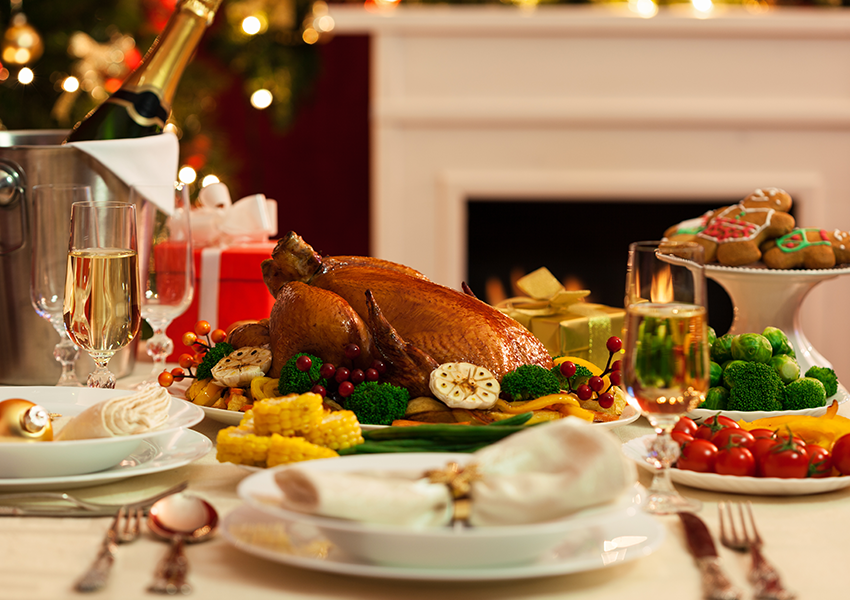The holidays are here and you’re probably already thinking about making some healthy resolutions that can wait until January 1. Did you know that with a few easy tips, you can avoid overeating and even prevent weight gain during the holidays without depriving yourself? Use these six helpful tips to enjoy the holiday season without any unpleasant surprises when you step onto the scale after New Year’s.
A study conducted in 2015 by Ohio State University showed the harmful effects that fasting has on weight fluctuations. Two groups of mice were studied. The first group had unlimited access to food. The second group was fed the same number of calories once a day. The result from this experiment was clear: the mice in the second group hadn’t lost any weight had even stored excess fat around their stomachs.
 These results are due to insulin production. Your liver regulates glucose levels by gradually and continuously secreting it into your bloodstream. When you eat, your pancreas secretes insulin, which causes your liver to stop producing glucose.
These results are due to insulin production. Your liver regulates glucose levels by gradually and continuously secreting it into your bloodstream. When you eat, your pancreas secretes insulin, which causes your liver to stop producing glucose.
This experiment proved that when you fast, your liver starts to resist insulin and continues to produce glucose even after you’ve started to eat again. As a result, there’s an excess of glucose in your body that your muscles can’t completely absorb. This excess is then turned into fat and stored around the stomach. So instead of helping you lose weight, skipping meals makes it easier to gain. You might think that you’re avoiding overeating, but you’re actually doing the opposite.
FizzUp trainer’s tip: Before your Christmas dinner, eat breakfast and lunch as usual.
Don’t rush through your Christmas dinner. It takes 15 to 20 minutes for hunger to disappear. In fact, 20 minutes after you start chewing, your brain secretes a neurotransmitter. This neurotransmitter, called histamine, serves several purposes. It plays an important role in regulating your biological clock as well as your attention span, alertness and diet. Concerning your diet, histamine is what tells your brain that you’re full. This signal stops the feeling of hunger and every bite you take from then on counts as “overeating.” When you finally feel full, that’s when it’s time to stop.
 FizzUp trainer’s tip: You can have one more bite if it makes you happy, but don’t overdo it!
FizzUp trainer’s tip: You can have one more bite if it makes you happy, but don’t overdo it!
To save room for dessert, help yourself to smaller portions during the meal. Start with foods that have low glycemic index values, such as vegetables and meat (except for cured meats and sausages). Then, have some starches with a higher glycemic index value. Focus on foods high in fiber like whole wheat bread or brown rice. Finish your meal with a small portion of a dessert with a high glycemic index value to make you feel full and satisfied. If you take our advice and slow down to enjoy your meals, you’ll satisfy your hunger and be able to have some dessert without any regrets.
FizzUp trainer’s tip: Pay attention to a food’s glycemic index value to help you avoid too much unhealthy fat, starch and calories.
Glucose is a source of energy and fuel for your body, which is turned into fat and stored if it’s not absorbed by your muscles. At night, your body doesn’t need a high intake of glucose because you’re not as physically active. Foods with a high glycemic index value are high in sugar, which is why you should eat fewer of them at dinner.
Fats, also called “lipids,” obviously play a major role in your everyday diet. They offer a wide range of benefits for your body by providing you with the fatty acids that it needs for healthy function. They’re a source of energy, help regulate body temperature and make it easier for your body to absorb important vitamins such as vitamins A, D, E and K. Despite the benefits, remember that there’s “good” and “bad fat”: unsaturated fat and saturated fat. Every food contains all kinds of fat; it’s just the amount of these fats that vary.
Unsaturated fat, which includes omega-3, omega-9 and omega-9, is considered “good fat” because it’s beneficial for heart health. It’s mainly found in vegetable oils and peanuts, but some foods, such as crab and salmon, contain a high amount of “good fat.”
Saturated fat, although it’s also good for your health, needs to be eaten in moderation. In fact, it’s known to create “bad cholesterol” in your blood, which can clog your arteries, making it dangerous for your cardiovascular health. Saturated fat isn’t only found in animal products (meat, cheese and butter), but also in fried and breaded foods, pastries and other baked goods. Some vegetable oils also contain saturated fat (especially palm oil).
We’re sure you know that the holidays are meant to be enjoyed to the fullest. Depriving yourself is totally out of the question. The key is to know how to enjoy yourself and avoid overeating. That also goes for alcoholic beverages. Often packed with sugar, cocktails play a major role in weight gain and should be avoided. But you CAN enjoy a glass of wine or champagne; these two drinks have low glycemic index values. But of course, drinking too much alcohol has harmful effects on your attention span, reaction time, mood and memory.
FizzUp trainer’s tip: You’ll enjoy the happy times spent with your friends and family even more if you cut down on the alcohol.
Do a simple physical activity after a meal, such as helping clear the table, doing the dishes or going on a walk to see the Christmas lights to help your digestion and help you absorb some of the sugar in your bloodstream. Although it’s recommended that you wait two hours after eating before doing a physical activity, you can still go on a walk right after you eat to help you digest. By lowering your blood sugar levels in your body, you can significantly reduce the amount of glucose that will turn into fat overnight.
FizzUp trainer’s tip: Now you can fully enjoy your holiday meals without dreading the next time you step onto the scale. Try these tips to give your New Year’s resolutions a head start. We wish you a happy holiday season with your friends and family!
What about you? What are some of your best tips for the holiday season?
Join the 7 million users already registered on FizzUp
Join us